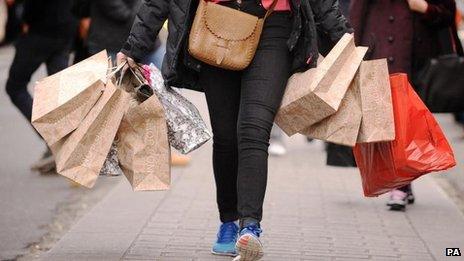Worrying trends for the UK economy
- Published
- comments

The OBR says people are cutting into their savings to fund spending
The British economy is recovering with an eye-catching improvement in GDP growth. But the fine print in the forecasts from the Office for Budget Responsibility (OBR) point to worrying trends in what's driving that growth.
Firstly, it is welcome five years from the banking crisis to see forecasts that GDP will grow at more than 2% -a figure that hasn't been seen since before the crash. In 2014, the OBR expects growth to be 2.4% instead of 1.8% as they originally forecast in March. For this year, the growth rate forecast has more than doubled from 0.6% to 1.4%.
The OBR says the main reason for the upward revisions is stronger consumption growth and residential investment. But worryingly, the OBR says that private consumption has largely come from households saving less rather than income growth. This means that people aren't spending because they have more income, but because they are cutting into their savings. This may be due to necessities such as energy becoming more expensive.
As the OBR points out, "productivity-driven growth in real earnings is necessary to sustain the recovery and raise living standards".
In other words, the record amount of private debt, which has just reached £1.43 trillion, points to how borrowing has fuelled consumption. As we saw from the crash five years ago when debt was lower than now, debt-fuelled consumption isn't a sustainable or reliable source of growth.
Boosting productivity
What would it take for incomes and earnings to rise? It requires workers to produce more in order to be paid more. At present, output per worker is weaker in the UK than any other country in the G7 aside from Italy. One of the reasons is that firms have hung onto valuable workers even though there is less work. It's one of the reasons why unemployment didn't rise as sharply as in the 1980s and 1990s recessions (when unemployment reached 10%) even though this latest recession has been worse. One reason why output per worker may improve is because workers may be just as productive as before, and are awaiting more investment and demand for the output.
So, lagging investment also plays a role. One of the ways to help workers become more productive is if there is investment. By adding more capital or technology, workers can be more productive at work. The OBR points out that business investment and net trade have continued to "disappoint". I have written before about the lack of rebound in business investment, which fell by 25% during the recession.
Thus, the OBR says that the recovery in productivity growth is "perhaps the most important judgement" in their forecast. What they are now expecting is that the amount of spare capacity in the economy will be absorbed by early 2019, two years earlier than in their March forecast.
This is why the OBR also says that they judge the "positive growth surprise" for this year to be due to spare capacity and not stronger underlying growth potential. That means that they think that growth has picked up due to the economy recovering some of the capacity that had been idle so it's a cyclical improvement rather than being driven by stronger earnings growth which would be a structural or longer-lasting effect.
Thus, the OBR expects growth to slow through 2014 and only pick up as productivity improves.
One question that this poses is whether productivity will pick up. Only if it does, can the UK grow again at around 2.6%, which has been the average growth rate since 1948.
Productivity may well pick up. But, there is another concern.
Could the UK be facing what the US economist Larry Summers has described as America's "secular stagnation". It's a worry that the ageing population and a slower growth of the labour force mean a slower growing economy. In the US, labour force growth will slow to just 0.2% from 2015 from 2.1% from the 1960s to 1980s. Fewer workers who need offices and computers will depress investment. For the UK, the annual average rate of labour force growth is forecast to slow to 0.43% from 2015.
The concern is that like Japan, the bursting of the debt bubble has revealed an underlying stagnation. Of course, Japan's population is shrinking unlike Britain and the US. A shrinking population makes it hard to rekindle growth and raise productivity. So, the new normal growth rate will be much slower than before. And worse, be stagnant.
For Britain, facing the slowest recovery in modern memory, this is a lesson to heed nevertheless.